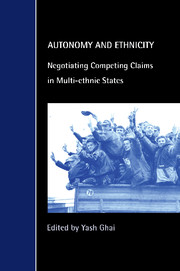Book contents
- Frontmatter
- Contents
- Acknowledgements
- List of Contributors
- 1 Ethnicity and Autonomy: A Framework for Analysis
- Part I Operating Autonomies
- Part II Failed Autonomies
- Part III Seeking Autonomies
- 8 Ethnicity and the New Constitutional Orders of Ethiopia and Eritrea
- 9 The Politics of Federalism and Diversity in Sri Lanka
- 10 Cyprus: From Corporate Autonomy to the Search for Territorial Federalism
- 11 Bougainville and the Dialectics of Ethnicity, Autonomy and Separation
- 12 The Implications of Federalism for Indigenous Australians
- List of Cases
- List of Legislation
- Index
8 - Ethnicity and the New Constitutional Orders of Ethiopia and Eritrea
Published online by Cambridge University Press: 06 July 2010
- Frontmatter
- Contents
- Acknowledgements
- List of Contributors
- 1 Ethnicity and Autonomy: A Framework for Analysis
- Part I Operating Autonomies
- Part II Failed Autonomies
- Part III Seeking Autonomies
- 8 Ethnicity and the New Constitutional Orders of Ethiopia and Eritrea
- 9 The Politics of Federalism and Diversity in Sri Lanka
- 10 Cyprus: From Corporate Autonomy to the Search for Territorial Federalism
- 11 Bougainville and the Dialectics of Ethnicity, Autonomy and Separation
- 12 The Implications of Federalism for Indigenous Australians
- List of Cases
- List of Legislation
- Index
Summary
The 1994 Ethiopian constitution creates a unique federal state. Its preamble declares:
We, the Nations, Nationalities and Peoples of Ethiopia … in the full exercise of our right to self-determination … [and] fully cognizant that our common destiny can best be served by rectifying historically unjust relationships … have adopted this Constitution through our [duly elected] representatives … [emphasis added]
The constitution goes on to reconstruct Ethiopia as a federation wherein ‘all sovereign power resides’, not in the people of Ethiopia but among its many, diverse ‘nations, nationalities and peoples’. No distinction is made between a nation and a people. Both are defined as a group sharing a common language, culture, customs, history and identity. All such groups are endowed with a corporate right to constitute themselves into a self-governing state or local government within a state. Each enjoys an unconditional right to self-determination, including the right to secession (articles 8 and 39).
In contrast, the preamble to the 1997 constitution of Eritrea – once a territory of the Ethiopian empire, but now (through force of arms and unilateral invocation of self-determination) Africa's newest independent state – declares:
We the people of Eritrea, united by a common struggle for our rights and common destiny … [and] desirous that the Constitution be a covenant … founded in national unity … do ratify … [emphasis added]
The constitution recognises Eritrea's notable ethnic, regional and religious pluralism, but it tells us that these peoples, as a result of their collective exercise of self-determination, are now a single nation ‘guided by the principle of unity in diversity’ (preamble and art. 6).
- Type
- Chapter
- Information
- Autonomy and EthnicityNegotiating Competing Claims in Multi-Ethnic States, pp. 173 - 196Publisher: Cambridge University PressPrint publication year: 2000
- 9
- Cited by

